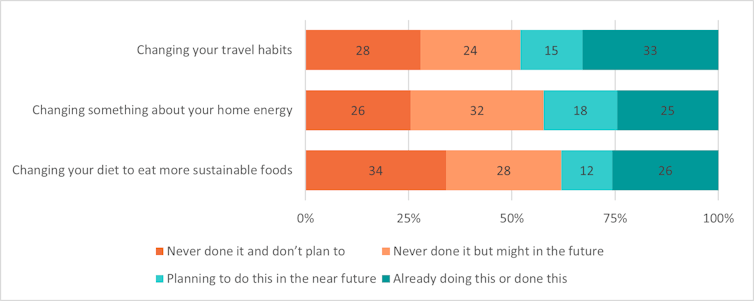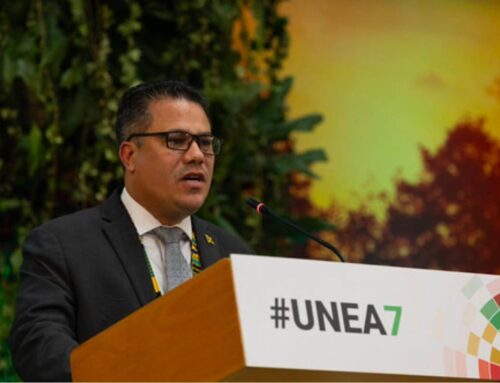Five ways to improve net zero action – our new research highlights lessons from the past
April 3, 2025
The current UK government and its recent predecessors have shown a reluctance to encourage and enable lifestyle changes that reduce our collective demand for energy.
Fearing a backlash from voters, many UK politicians neglect key weapons in the fight to mitigate climate change. These include directing investment away from building roads to public transport, establishing reliable infrastructure for the charging and repair of electric vehicles, and making reduction of car travel a key priority for urban planners.
As researchers focusing on how to accelerate climate action, we argue that shying away from changing the way we live is counterproductive. Conflict and disagreement are part of social change, but there are positive ways forward.
The problems and, critically, the solutions have overwhelmingly been presented by UK governments as technological. But many of these technologies are still only in development.
Practical use of nuclear fusion (the energy-generating mechanism that powers the sun), for example, has long been spoken of as “30 years away”. The efficacy of direct air capture (a set of technologies that extract CO₂ directly from the atmosphere) remains a matter of conjecture.
Meanwhile, demand reduction and lifestyle changes – solutions we know make a difference – are being left in the background.
In the run-up to the 2024 UK general election, we conducted a survey of almost 3,000 UK citizens – of which just over half (51%) expressed support for a net zero carbon emissions target. Given the apparent indifference or outright opposition of a substantial proportion of voters, it is not surprising that politicians seek to minimise objections to net zero policy by downplaying any suggestion of personal disruption.
Our survey also asked about people’s willingness to make specific lifestyle changes (to home energy, diet and travel) for climate reasons. On average, 43% were already acting or firmly planning to do so. Another 28% said they might be prepared to make such changes in the future.
Willingness to make climate-related lifestyle changes:

https://accessnetwork.uk/making-a-net-zero-society-follow-the-social-science/
This ties in with other research which indicates that people are open to significant changes in their lifestyle to support net zero, if the conditions are right. So, how can this potential for change be realised?
The answer, we argue, lies in the recent past. Over the last year, as part of a social science taskforce on net zero, we looked back at a diverse range of case studies of societal change to draw lessons for future policy. We now propose that five key steps are needed for effective net zero action.
1. Galvanise people
When seeking to build support for contentious change, it is vital to identify issues that can galvanise people. These will often relate to other (non-net zero) benefits. For instance, “school streets” projects have been successful, where other traffic reduction policies have failed, because they emphasise the benefits to the health and wellbeing of children.
Similarly, the rapid switch from coal heating to gas central heating in the 1960s and ’70s was partly connected to a popular movement for cleaner, “decent” homes.

Rawpixel.com/Shutterstock
2. Focus on fairness
In our survey, just 37% of people saw a fairer society as a likely outcome of net zero actions, while 63% identified individual finances as a major challenge to achieving net zero. Regulation needs to establish a close connection between net zero measures and equity, so that no groups are unfairly burdened or advantaged. This requires an honest discussion about downsides and trade-offs.
Measures that focus on cheaper bills, affordable devices, accessible transport and the alleviation of fuel poverty will build optimism. In the successful Danish transition to district heating from the mid-1970s, ensuring affordable and reliable energy was vital in gaining support, as was giving residents a say in decision-making.
3. Make the policy process relatable
We noticed that survey participants expressed a lot of cynicism and uncertainty about government action on net zero. Nearly half (46%) doubted that the net zero target was achievable, while most people (62%) had serious concerns about vested interests, under-resourced local authorities (59%), and a lack of government investment in infrastructure (59%).
People also feel disconnected from decision-making. Many said they had little or no influence on climate policy (59%), and felt there was a lack of power in communities (51%).
Local authorities, businesses, community groups and other third-sector organisations can help bridge these gaps between national government and everyday life. They should play a key role delivering net zero policies that fit with local needs and issues.
When Denmark switched to district heating, the delegation of powers to municipal authorities was crucial in supporting community ownership models and empowering residents and community groups. Properly resourced local climate commissions – town- and city-wide groups that bring together local organisations and businesses – can provide an independent, trusted voice to help drive climate action at a local level.
4. Listen to other people
People need the chance to listen to and engage with each other. If they doubt their opinions and concerns are recognised, or if their worries are viewed as nothing more than obstacles, conflict becomes more likely.
Proper dialogue through collaborations like climate citizens’ assemblies can improve understanding of different positions, aspirations and capabilities. Once legitimate concerns and unintended consequences have been identified, potential solutions can be explored.
There is certainly support for this more interactive approach: 40% of people in our survey felt that affected communities should have a considerable influence on climate policies, alongside local authorities (40%) and elected MPs (42%).
Without these ongoing conversations, projects can fail. A Dutch carbon capture and storage project, using a depleted gas field under the town of Barendrecht to store CO₂ from a nearby refinery, was cancelled in 2010 following intense local opposition. The government and industry had failed to get public engagement right from the start.
5. Accept some opposition
Change to net zero is going to be difficult, and no step the UK government takes will completely eliminate the possibility of disruption and conflict. In our survey, nearly a quarter of respondents were opposed to the UK net zero target. So, politicians need to be more robust and interventionist in making a positive case for net zero, recognising that not everyone is going to agree.
However, there are grounds to be optimistic that action itself may help unlock support for net zero. Research that has followed school streets projects, for example, shows that once schemes are in place, support among residents and parents increases when anticipated problems (such as traffic displacement) do not materialise – and when the benefits, in terms of children walking and cycling more, become clear.

Don’t have time to read about climate change as much as you’d like?
Get a weekly roundup in your inbox instead. Every Wednesday, The Conversation’s environment editor writes Imagine, a short email that goes a little deeper into just one climate issue. Join the 40,000+ readers who’ve subscribed so far.
Search
RECENT PRESS RELEASES
Related Post



